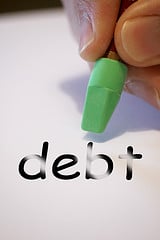When debt is piling up and the bill collectors are calling, it’s easy to get overwhelmed. You’re worried about your home, your car, and even your utilities. When you don’t have enough cash to make ends meet, what can you do?
Not all debts are created equal, and there are some that you should pay more attention to than others. If you can’t pay everything, you’ll have to pick which ones you do pay. So, the first step is to prioritize your debts. How can you tell which debts need to be paid first?
Prioritizing Your Debts

If you don’t make car payments, the bank can repossess your car and sell it. If it sells for less than what you owe (and it almost always will be), you’ll be liable for the deficiency. If you don’t make mortgage payments, the bank can foreclose on your home. In the wake of the 2008 crisis, many homes are still “underwater,” meaning they’re worth less than the mortgage. As with the repossession and sale of a car, you’ll be liable for the deficiency if your home sells for less than you owe. In either case, you’ll be stuck with the leftover debt but without a car or a home. So, the first debts on your list should be your secured debts.
Choosing Between Car and Mortgage Payments
What if you can’t make both your car and your mortgage payments? Unfortunately, that means you may have a tough decision ahead. If you make a partial payment on a debt, the bank will likely count it as if you hadn’t made a payment at all. They may return your check or they may cash it and keep it in a “suspense account.” When you’ve contributed enough partial payments to make a full payment, they’ll take that out of the suspense account and apply it to the first month of “missed” payments. Because the payments don’t count until they can apply a full month’s payment, your account will be considered delinquent. They’ll report it to the credit bureaus and may start repossession or foreclosure proceedings. So, how do you choose?
First, you should contact your lender if you know you’re going to fall behind on payments. They’ll often be willing to work with you to ease the burden for a couple of months while you get your finances on track.
If not, consider making just your car payment. The foreclosure process takes a long time – an average of 19 months as of the first quarter of 2014, but can be much shorter than that. Remember that every foreclosure is different, and the timeline may vary significantly depending on the circumstances. Car repossessions, in general, happen much more quickly. The repo men may show up as soon as a couple of days after the crucial missed payment. Keep making your car payments so you can get to work, doctor’s appointments, and anywhere else you need to go. The longer home foreclosure process can give you some time to get back on your feet.
Choosing between your car and your home is a difficult and serious decision, so think carefully about what you can afford and what will best suit your needs.
Credit Cards
You’ve probably noticed that we haven’t mentioned credit card debt yet. That’s because, in the hierarchy of debts, it should be last on your list. Credit card debt is “unsecured” debt – it’s not linked to any property. If you don’t pay it, the most your creditor can do is sue you for collection. In California, state exemptions will protect a lot of your property from a collection lawsuit, so you may even be “judgment proof.” That means that a creditor can sue, but won’t be able to collect anything because all of your property is exempt.
Medical debt should fall at the very end of the list, too. It’s unsecured and can only be collected by judgment, just like credit card debt.
Bankruptcy
Bankruptcy is another reason to make your car payments, then your mortgage payment, then credit card and medical debt payments. When you file for bankruptcy, you get the benefit of the automatic stay. That means all collection actions, including repossession, wage garnishment, foreclosure, and collection suits, have to stop. In order for the automatic stay to protect your home, you just have to file before the home is sold. As long as you make your car payments, the long foreclosure periods give you enough time to decide if bankruptcy is right for you
After your bankruptcy, your unsecured debts will be discharged. That means your medical and credit card debt will be forgiven. So, if you’re struggling with debt, you shouldn’t pay credit card and medical debt because you can get rid of it in bankruptcy. In addition to the discharge of your unsecured debt, you’ll no longer be personally liable for your secured debts. That means that if your home is foreclosed, you won’t be liable for the deficiency.
Dealing with Debt Collectors
Those debt collectors calling your home will try to hype up the importance of their debts in order to coerce you into paying. Ignore them. You need to make decisions about what payments to make based on your own needs and circumstances. You have the legal right to ask debt collectors to stop calling your home and leave you in peace. They may still pursue other avenues, such as repossession, foreclosure, and lawsuits, but they have to notify you.
Get Help for Your Debts
These guidelines are general and may not be right for your unique situation. If you’re struggling with debt, contact one of our experienced consumer bankruptcy attorneys for a free consultation. There’s no obligation to file for bankruptcy, and we can help you decide how best to deal with your debt problems.
Image Credit and License
